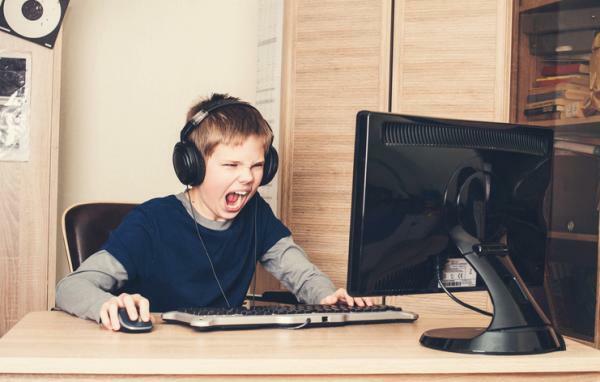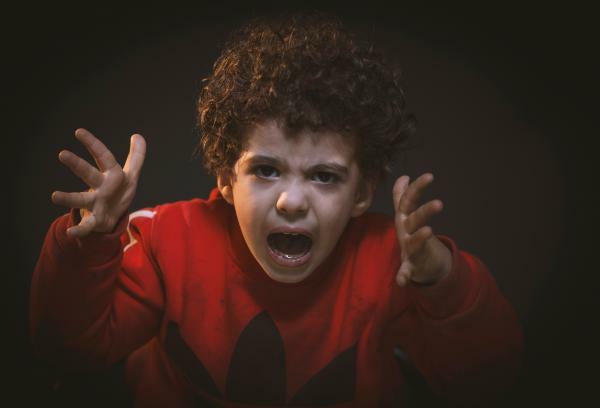
Some children show aggressive behaviors such as kicking or pushing other children, but these types of attitudes tend to disappear when they start primary school because by that time they have already developed the language skills necessary to express themselves with words and have already acquired a level of socialization in which they are aware that physical aggression is wrong. If your child has not learned it, we must identify the cause in order to act. In this Psychology-Online article, we tell you How to deal with aggressiveness in children from 6 to 12 years old.
All children have at some point pushed another child, kicked an object when they don't get what they want, etc. However, a child who has an aggressive problem or disorder will exhibit some of the following characteristics:
- Often gets angry intensely
- It is extremely irritable or impulsive and has trouble staying focused
- Easily frustrated
- Attacks and physically fights other children or adults
- Often it is disturbing
- Have a poor performance in school or is unable to participate in the classroom or other organized activities
- Has trouble acting properly in social situations and making friends
- You continually argue or fight with family members and does not accept authority parental
- Inevitably defies authority and refuses to obey rules
- Frequently denies responsibility for misconduct and blames others
An aggressive child will act in this way in more than one area of his life: at school, at home, social events, sports competitions ...

It could be a learning, behavioral, or emotional disorder that makes it difficult for you to listen, concentrate, or read, hampering your performance in school. Or it could be that the child is going through a bad situation like The divorce of her parents. Although in most cases children become aggressive because they have been witnesses to the aggression of others, some causes of aggressive behavior can be:
- Family difficulties. Fighting, problems, or changes in a child's home put stress on them, making it possible for them to react aggressively, especially if you have previously seen someone in your family behave like this.
- Learning disorder If your child has a problem that makes it difficult for him to read, write, or understand language, he can vent her frustration through aggression.
- Neurological problems Sometimes aggressiveness is due to some neurological involvement.
- Behavioral disorders. Some children with behavioral disorders they also have aggressive behaviors or oppositional defiant disorder.
- Emotional trauma Domestic violence or sexual abuse can lead to intense anxiety, fear, and depression. There are children who find in aggression a way to release that anxiety.
- Exposure to violent television shows or movies. Many experts believe that witnessing screen violence It can cause aggression temporarily in children.

To know how to deal with aggressiveness in children 6 to 12 years old, the first thing is don't get aggressive. Hitting, yelling, or throwing objects when your child pushes you to the limit will not solve the problem. It will just give you an example of how to act aggressively. Show him that you can control your temper and thus help him learn that he can control his.
You should try to teach your child to recognize and understand your emotions and guide you toward acceptable ways of showing anger, fear, and disappointment. Some tips that can help you are:
Respond immediately to aggressive behavior
Do not wait for your son to end up hitting her brother a second time, for example, to tell him that enough is enough. Your child should know instantly when he has done something wrong. You can try "time-ins": stop what you are doing and ask your child to sit down and be silent. Hug or touch him lovingly, if your child allows it. After a few calm minutes, talk briefly about what happened. Then just resume your activities. (This technique can be used instead of sending him a few minutes to his room: time-outs).
Try to calm down
Once your child has calmed down it is good to talk about what happened, but before he forgets about the episode, ideally a couple of hours later. Try to calm down and gently review the circumstances that led to the aggressive behavior. Ask him to explain what triggered it. Emphasize that it is perfectly normal to be angry, but that it is not okay to show it that way: hitting, kicking, or biting. Suggest better ways to respond, for example by verbally expressing your emotion or by stepping away from the situation or the person so that you have time to calm down and think about what to do.
Consistent discipline
As much as possible, you should respond to each aggressive episode in the same way. Over time, your consistent response to these types of behaviors will establish a pattern that your child will recognize. Finally, your child will internalize that pattern and anticipate the consequences before acting, this is the first step to regulate his own behavior.
Promote self-control
Instead of paying attention to your child just for being bad, try to show him the moments when he is good. It emphasizes that self-control and conflict resolution are skills he will need to be successful and loved in education or work. If your child finds it difficult to advance on this topic, you can reward him each time he manages to control his temper. It can be as simple as having some extra time with you. The important thing is that the reinforcement is something that he wants.
Hold him accountable
If your child damages someone's property, he should know that it must be corrected. It is important for the child to understand that it is not a punishment but the natural consequence of an inappropriate act towards another person.
Educate him not to act aggressively
Show him that reacting aggressively is inappropriate because it hurts or affects other people. It is good to do exercises of supposed situations to show how the actions of each one affect other people and develop empathy. For this advice, we recommend the following article, in it you will find activities and games to work empathy in children.
This article is merely informative, in Psychology-Online we do not have the power to make a diagnosis or recommend a treatment. We invite you to go to a psychologist to treat your particular case.


